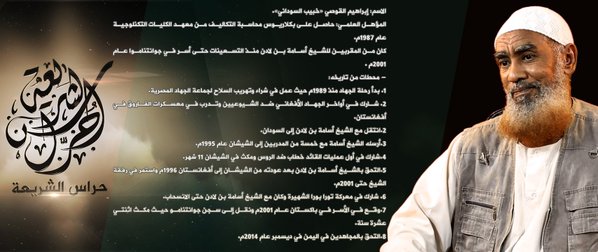 Guantanamo detainee now an al Qaeda leader in Yemen
Guantanamo detainee now an al Qaeda leader in YemenBY THOMAS JOSCELYN
December 9, 2015
 Ibrahim al Qosi, an ex-Guantanamo detainee, now serves as a leader and spokesman for al Qaeda in Yemen.
Ibrahim al Qosi, an ex-Guantanamo detainee, now serves as a leader and spokesman for al Qaeda in Yemen.Al Qaeda in the Arabian Peninsula (AQAP) released a new video featuring a former Guantanamo detainee, Ibrahim Qosi, who is also known as Sheikh Khubayb al Sudani.
In July 2010, Qosi plead guilty to charges of conspiracy and material support for terrorism before a military commission. His plea was part of a deal in which he agreed to cooperate with prosecutors during his remaining time in US custody. Qosi was transferred to his home country of Sudan two years later, in July 2012.
Qosi joined AQAP in 2014 and became one of its leaders. Qosi and other AQAP commanders discussed their time waging jihad at length in the video, entitled "Guardians of Sharia."
Islamic scholars ensure the "correctness" of the "jihadist project," according to Qosi. And the war against America continues through "individual jihad," which al Qaeda encourages from abroad. Here, Qosi referred to al Qaeda's policy of encouraging attacks by individual adherents and smaller terror cells. Indeed, AQAP's video celebrates jihadists who have acted in accordance with this call, such as the Kouachi brothers, who struck Charlie Hebdo?s offices in Paris earlier this year. The Kouachi brothers? operation was sponsored by AQAP.
The al Qaeda veterans shown in the video emphasized the importance of following the advice of recognized jihadist ideologues. Although AQAP?s men do not mention the Islamic State by name, they clearly have Abu Bakr al Baghdadi?s group in mind. Al Qaeda has criticized the Islamic State for failing to follow the teachings of widely respected jihadist authorities, most of whom reject the legitimacy of Baghdadi's self-declared "caliphate."
Qosi's appearance marks the first time he has starred in jihadist propaganda since he left Guantanamo. His personal relationship with Osama bin Laden and time in American detention make him an especially high-profile spokesman.
A leaked Joint Task Force Guantanamo (JTF-GTMO) threat assessment and other declassified files documented Qosi?s extensive al Qaeda dossier. In the threat assessment, dated Nov. 15, 2007, US intelligence analysts described Qosi as a "high" risk to the US and its allies.
"Detainee is an admitted veteran jihadist with combat experience beginning in 1990 and it is assessed he would engage in hostilities against US forces, if released," JTF-GTMO found.
In 1990, Qosi met two al Qaeda members who recruited him for jihad in Afghanistan.
Qosi was then trained at al Qaeda's al Farouq camp, which was the terror group's primary training facility in pre-9/11 Afghanistan. In 1991, Osama bin Laden relocated to Sudan and Qosi followed. He worked as an accountant and treasurer for bin Laden?s front companies, a role he would continue to fill after al Qaeda moved back to Pakistan and Afghanistan in the mid-1990s.
JTF-GTMO found that after an attempt on bin Laden's life in 1994, Qosi was chosen to be a member of the al Qaeda founder's elite security detail. He was also picked to perform sensitive missions around that time.
For example, Qosi served as a courier and may have delivered funds to the terrorist cell responsible for the June 25, 1995 assassination attempt on Egyptian President Hosni Mubarak. Qosi relocated to Chechnya that same year, before returning to bin Laden's side in Afghanistan some time in 1996 or 1997.
From 1998 to 2001, JTF-GTMO's analysts wrote, Qosi traveled back and forth between the front lines near Kabul and Kandahar to help with the fight against the Northern Alliance.
In Dec. 2001, the Pakistanis captured Qosi as he fled the Battle of Tora Bora. He was detained as part of a group dubbed the "Dirty 30" by US intelligence officials. The "Dirty 30" included other members of bin Laden's bodyguard unit, as well as Mohammed al Qahtani, the would-be 20th hijacker. Qahtani, who was slated to take part in the Sept. 11, 2001 hijackings, had been denied entry into the US just months before.
While detained at Guantanamo in 2003, Qosi was asked why he stayed true to bin Laden for so many years. According to JTF-GTMO, Qosi explained it was his "religious duty to defend Islam and fulfill the obligation of jihad and that the war between America and al Qaeda is a war between Islam and aggression of the infidels."
Qosi made it clear in AQAP's new production that he hasn't changed his opinion in the twelve years since.
http://www.longwarjournal.org/archives/2015/12/ex-guantanamo-detainee-now-an-al-qaeda-leader-in-yemen.php